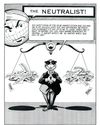Try GOLD - Free
THE MINESWEEPER MORAL PANIC
Reason magazine
|November 2023
WHEN COMPUTERS CAME TO OFFICES, BOSSES FOUND A NEW WAY TO WORRY THAT WORKERS WERE WASTING TIME.

OVER-THE-TOP VIOLENCE IN such video games as Mortal Kombat and Doom drew handwringing moral outrage from worrywart parents and government scolds throughout the ’90s. Minesweeper—in which players click around a rectangular grid of squares trying to avoid hidden mines, using logical rules to interpret numbers—seemed like it should be safe from controversy.
Yet somehow the game was central to a minor moral panic that formed around pre-installed computer games as Windows spread through offices in the ’90s. Together, Minesweeper and Solitaire were seen as an unwelcome office distraction at best and a dire threat to worker productivity at worst.
That fearful response didn’t start right away, as Minesweeper didn’t receive much critical attention during its initial release in 1990. Ender’s Game author Orson Scott Card came closest to predicting the moral panic to come. In a 1991 Compute! magazine story, he called Minesweeper “the most diabolically addictive game I’ve seen lately.” He recommended the game only to Windows owners who had “enough iron self-control to get your real work done before you play.”
Themes of addiction and self-control would become common among writers exposed to Minesweeper in the years to come. Harry Potter creator J.K. Rowling, for instance, wrote in 2004 that she used Minesweeper as a replacement addiction when she was trying to quit smoking. (She went on to boast that she had “become rather good” and achieved a record of 101 seconds on the expert level.)
And among a certain segment of America’s leadership class, the conventional wisdom was that Minesweeper,
This story is from the November 2023 edition of Reason magazine.
Subscribe to Magzter GOLD to access thousands of curated premium stories, and 10,000+ magazines and newspapers.
Already a subscriber? Sign In
MORE STORIES FROM Reason magazine

Reason magazine
A Nostalgic Read for Foreign Policy Elites
IF YOU WERE looking for a human avatar of America's unipolar moment, you couldn't do better than Michael McFaul. Picture a youthful, energetic McFaul with a newly minted Ph.D. bounding into the suddenly post-Soviet space of the early 1990s, full of bright ideas about democracy and faith in the end of history. As McFaul himself puts it, 1991 \"was a glorious moment to be a democratic, liberal, capitalist, multilateralist, and American....I was treated like a rockstar.\"
4 mins
January 2026

Reason magazine
TRUMP IS DEPORTING ENTREPRENEURS
THE TRUMP ADMINISTRATION'S MASS DEPORTATION EFFORT IS ROBBING THE U.S. OF IMMIGRANT BUSINESS OWNERS AND THEIR CONTRIBUTIONS.
9 mins
January 2026
Reason magazine
The First Information Revolution
PRINTING PRESSES AND LIBRARIANS INTERPRETED CENSORSHIP AS DAMAGE AND ROUTED AROUND IT.
11 mins
January 2026

Reason magazine
What Would Bill Buckley Do?
THE NATIONAL REVIEW FOUNDER'S FLEXIBLE APPROACH TO POLITICS DEFINED CONSERVATISM AS WE KNOW IT.
7 mins
January 2026

Reason magazine
MAHA Mandates Food Labels
BURDENSOME FOOD LABELING mandates were once the province of Democrats, who pushed for calorie count requirements on restaurant menus and insisted packaged food must feature warnings about genet- ically modified ingredients and trans fats. Now it's Republicans leading the charge- with equally foolish results.
2 mins
January 2026

Reason magazine
IS JAKE TAPPER DOOMED?
THE CNN ANCHOR ON THE WAR ON TERROR, THREATS TO FREE SPEECH, AND THE FUTURE OF MEDIA
14 mins
January 2026

Reason magazine
REPUBLICAN SOCIALISM
THE TRUMP ADMINISTRATION IS BUYING STAKES IN COMPANIES. THAT NEVER ENDS WELL.
13 mins
January 2026

Reason magazine
A Taste of Capitalism in Warsaw
WARSAW, POLAND, IS a living museum of economic systems. It's a city where concrete reliefs of stoic factory workers decorate a building that now houses a Kentucky Fried Chicken, where a Soviet-era apartment block stands beside a glass tower filled with coworking spaces.
2 mins
January 2026

Reason magazine
Robert Crumb's Roving Art and Life
IN THE SPRING of 1962, an 18-year-old Robert Crumb was beaned in the forehead by a solid glass ashtray. His mother, Bea, had hurled it at his father, Chuck, who ducked. Robert was bloodied and dazed, once again a silent and enraged witness to his family's chaos.”
5 mins
January 2026

Reason magazine
THE HOWARD ROARK OF COMICS
SPIDER-MAN CO-CREATOR STEVE DITKO WAS A GREAT EXAMPLE OF, AND DIRE WARNING TO, OBJECTIVIST POP ARTISTS.
12 mins
January 2026
Translate
Change font size

